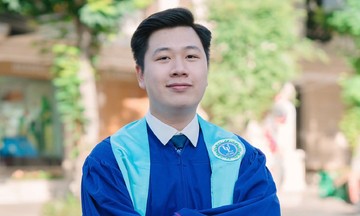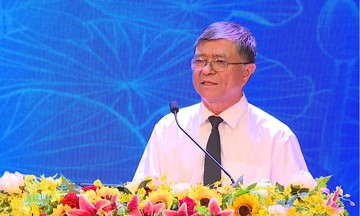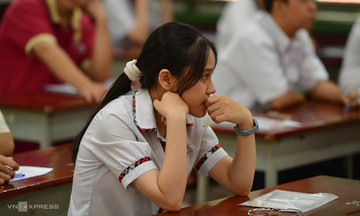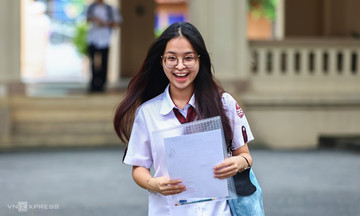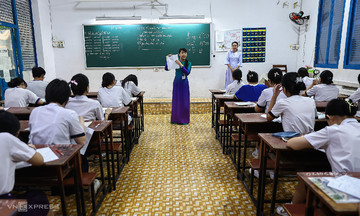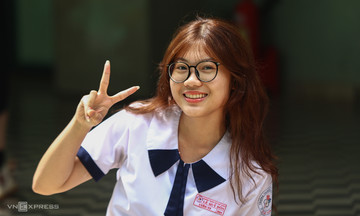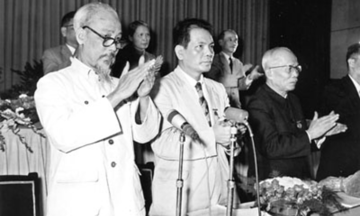At the end of May, 27-year-old Trinh Mai Chi received her medical degree from Johns Hopkins University, ranked third globally in health sciences and pharmacy by QS Ranking 2025.
She also secured a place in the six-year diagnostic and interventional radiology residency program at Beth Israel Deaconess Medical Center, a general hospital established in 1996 and affiliated with Harvard Medical School.
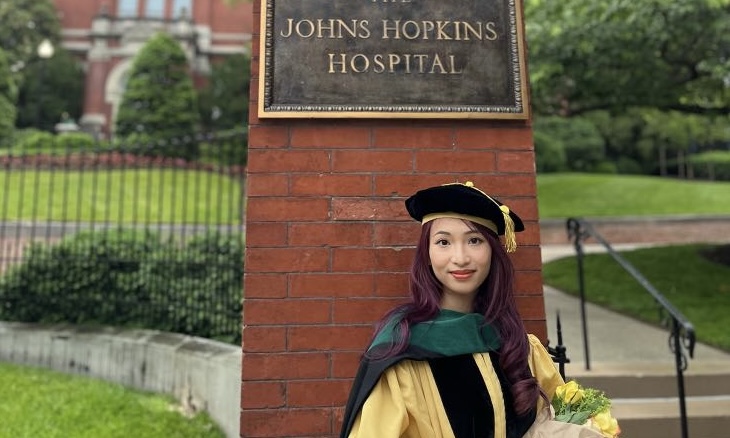 |
Trinh Mai Chi at her John Hopkins University graduation ceremony at the end of May. Photo: Provided by the subject |
Trinh Mai Chi at her John Hopkins University graduation ceremony at the end of May. Photo: Provided by the subject
Almost 10 years ago, Chi, a German language student at the Hanoi National University of Education's High School for Gifted Students in Foreign Languages, received a full scholarship to study biochemistry at Wellesley College in the US.
Chi's college life revolved around research and volunteer work. In her freshman year, she researched the properties of the BCR-ABL kinase protein, which causes chronic myeloid leukemia. She studied the electrostatic interaction between some drugs, particularly Imatinib and Ponatinib, and variants of this protein to understand drug resistance mechanisms.
During the summer of her sophomore year, she researched childhood neuroblastoma at Dana Farber Cancer Institute and Boston Children’s Hospital, a teaching hospital of Harvard Medical School. The following year, she studied juvenile dermatomyositis at the Ann & Robert H. Lurie Children's Hospital of Chicago, affiliated with Northwestern University Feinberg School of Medicine. She helped analyze data from over 3,000 examinations to find more effective diagnostic criteria, contributing to the discovery of the important role of natural killer (NK) cells in the disease.
Chi also ran the Blue Cancer Society, where she participated in fundraising, supported cancer patients, and taught math and science to immigrant children in Boston.
The support and mentorship she received from doctors at clinics and specialized seminars inspired Chi to pursue medicine and apply for scholarships to medical schools.
In the US, studying medicine is equivalent to a master's degree. Students need to graduate in related fields like biology or psychology to qualify for admission. Applications typically include academic transcripts, MCAT (Medical College Admission Test) scores, personal essays, letters of recommendation, and experience in the medical field.
Academically, Chi graduated summa cum laude, an honor reserved for the top 5% of Wellesley College graduates, in 2020. She self-studied for the MCAT and scored 519/528, placing her in the top 3% nationwide.
She prepared her application within a year after graduation while conducting research at the oncology department of Boston Children’s Hospital, a pediatric hospital affiliated with Harvard Medical School. As a result, she received a full scholarship to study medicine at Johns Hopkins.
"I still couldn't believe I had done it until I signed the commitment letter in April four years ago," Chi recalled.
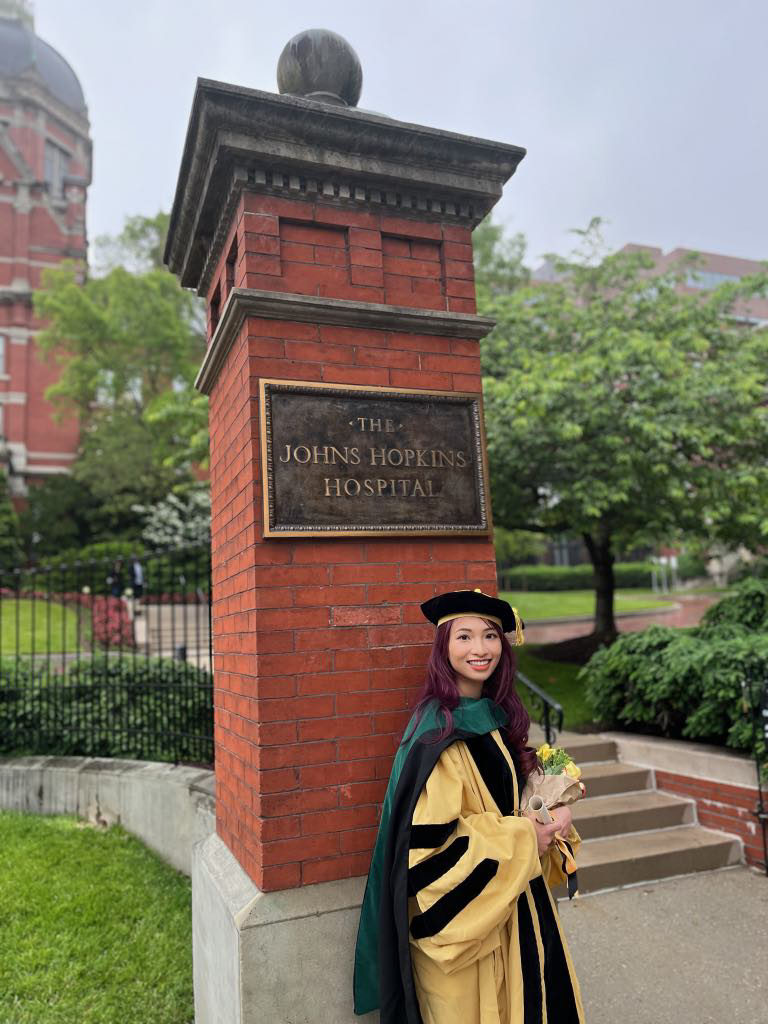 |
Trinh Mai Chi. Photo: Provided by the subject |
Trinh Mai Chi. Photo: Provided by the subject
During her four years at Johns Hopkins, Chi balanced coursework, clinical practice, and scientific research. Initially unsure of her specialization, she explored dermatology and obstetrics and gynecology before choosing diagnostic and interventional radiology.
Securing a residency is a prerequisite for this path. Typically, students need medical school transcripts, USMLE (United States Medical Licensing Examination) scores, letters of recommendation, and a personal statement to apply for residency programs through the ERAS (Electronic Residency Application Service) system, followed by interviews.
This process differs from Vietnam, where final-year medical students take a residency exam with multiple-choice questions in three subjects: major 1 (internal medicine and pediatrics), major 2 (surgery and obstetrics and gynecology), and basic sciences (anatomy, biochemistry, physiology, and medical genetics). Only after passing the exam can students choose their specialization.
"This field is highly competitive for international students, so in addition to high clinical practice and USMLE scores, you need a strong research record," Chi said, noting the constant pressure. From her second year at Johns Hopkins, Chi spent many months in clinical practice, studied for standardized tests in the evenings, and dedicated 5-8 hours every weekend to research.
During this time, she and her colleagues conducted clinical and epidemiological research in dermatology, immunology, and oncology, particularly in pediatric patients. Chi's projects used big data, molecular biology, and educational interventions to improve diagnosis, prognosis, and patient experience. The research was subsequently published in medical journals like the Journal of the American College of Radiology, a top-tier Q1 journal.
"Many residency applicants take a year off to gain experience and improve their research record, but I didn't want to take a year off just for research," Chi explained her decision to multitask.
After four years, Chi received the highest possible grade, Honors, in all her courses at Johns Hopkins.
In her final year, Chi finalized her clinical experience, passed the USMLE, obtained letters of recommendation from professors, and wrote essays about her desire to become a resident to contribute to the community. She then successfully completed the interview process.
Dr. Troy Zhou, former Chief of Medical Physics and Radiology at Johns Hopkins University, who worked with Chi on a project to optimize radiation in X-rays, praised her dedication to patients and her outstanding clinical and research skills. He credited Chi with the project's success, which was voted Best Presentation at the annual forum of the Performance and Quality Improvement Committee of the Society of Interventional Radiology.
"Trinh is full of integrity and compassion. Despite being an international student, she has overcome the challenges of studying medicine, demonstrating professionalism and maturity," Dr. Zhou wrote.
On her journey to becoming a doctor, Chi feels she has grown significantly. "The profession is demanding, and the studies are long, but it aligns with my passion, contributes meaningfully to people and society, so I am very happy with my choice to become a doctor," Chi said.
Mai Chi said she will strive to complete the six-year residency program to become a specialist in diagnostic and interventional radiology while continuing to participate in scientific research.
Doan Hung



